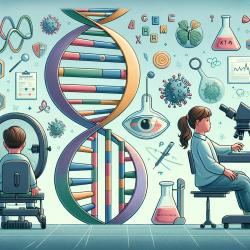Introduction: The Power of Precision in Diagnosis
As practitioners dedicated to improving the lives of children, understanding the root causes of developmental delays is paramount. A recent study, "Diagnosis of Arboleda-Tham Syndrome by Whole-Exome Sequencing in an Asian Girl with Severe Developmental Delay," sheds light on the transformative potential of whole-exome sequencing (WES) in diagnosing complex genetic conditions. This research underscores the importance of precision in diagnosis, which can lead to more targeted and effective interventions.
Understanding Arboleda-Tham Syndrome
Arboleda-Tham syndrome is a rare genetic disorder characterized by a wide phenotypic spectrum, including global developmental delay, intellectual disability, and distinct facial features. It is associated with mutations in the KAT6A gene, which plays a critical role in histone acetylation and gene expression regulation. The study focuses on a novel frameshift mutation in this gene, expanding the known spectrum of pathogenic variants.
The Role of Whole-Exome Sequencing
Whole-exome sequencing is a powerful tool that allows for the comprehensive analysis of all coding regions in the genome. In the study, WES identified a de novo frameshift mutation in the KAT6A gene, which was not present in the parents and was absent from major genetic databases. This finding highlights the capability of WES to uncover novel mutations that may not be detectable through traditional genetic testing methods.
Implications for Practice
For speech-language pathologists and other practitioners, incorporating genetic insights into clinical practice can significantly enhance the understanding of a child's developmental profile. Here are some ways to leverage these findings:
- Early Identification: Utilize WES to identify genetic causes of developmental delays early, allowing for timely and tailored interventions.
- Customized Interventions: Develop personalized therapy plans based on the specific genetic profile of each child, potentially improving outcomes.
- Collaborative Care: Work closely with geneticists and other healthcare providers to integrate genetic findings into comprehensive care plans.
Encouraging Further Research
This study invites practitioners to delve deeper into the genetic underpinnings of developmental disorders. By staying informed about the latest research and advancements in genetic testing, practitioners can better serve their clients and contribute to the growing body of knowledge in this field.
Conclusion
The diagnosis of Arboleda-Tham syndrome through whole-exome sequencing exemplifies the potential of genetic research to transform clinical practice. By embracing data-driven approaches and continuing to explore the genetic basis of developmental delays, practitioners can unlock new pathways to success for children.
To read the original research paper, please follow this link: Diagnosis of Arboleda-Tham syndrome by whole-exome sequencing in an Asian girl with severe developmental delay.










